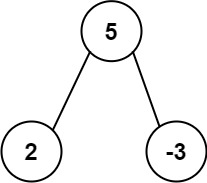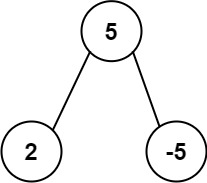Given the root of a binary tree, return the most frequent subtree sum. If there is a tie, return all the values with the highest frequency in any order.
The subtree sum of a node is defined as the sum of all the node values formed by the subtree rooted at that node (including the node itself).
Example 1:
Input: root = [5,2,-3] Output: [2,-3,4]
Example 2:
Input: root = [5,2,-5] Output: [2]
Constraints:
- The number of nodes in the tree is in the range
[1, 104]. -105 <= Node.val <= 105
Related Topics:
Hash Table, Tree, Depth-First Search, Binary Tree
Similar Questions:
// OJ: https://leetcode.com/problems/most-frequent-subtree-sum/
// Author: github.com/lzl124631x
// Time: O(logN)
// Space: O(N)
class Solution {
public:
vector<int> findFrequentTreeSum(TreeNode* root) {
vector<int> ans;
int maxFreq = 0;
unordered_map<int, int> m;
function<int(TreeNode*)> dfs = [&](TreeNode *root) {
if (!root) return 0;
int left = dfs(root->left), right = dfs(root->right), sum = left + right + root->val, f = ++m[sum];
if (f > maxFreq) maxFreq = f, ans = {sum};
else if (f == maxFreq) ans.push_back(sum);
return sum;
};
dfs(root);
return ans;
}
};
